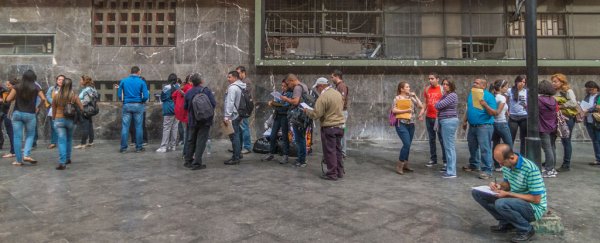In an emergency measure designed to ease the burden on Venezuela's struggling electricity network, President Nicolas Maduro has issued a public decree, stating that Friday will be a holiday for all public sector employees for the duration of April and May.
The nation's electricity is highly dependent on hydro-electricity, and with El Niño conditions currently creating Venezuela's worst drought in 47 years, the power grid – and especially the Guri Dam – is under serious pressure. The Guri Dam provides as much as 75 percent of the power used by Venezuela's capital, Caracas, and 40 percent of the nation's electricity demand as a whole. And it's running perilously low.
In a television address, Maduro appealed to the nation to back efforts to reduce electricity consumption.
"This plan for 60 days, for two months, will allow the country to get through the most difficult period with the most risk," he said. "I call on families, on the youth, to join this plan with discipline, with conscience and extreme collaboration to confront this extreme situation."
Under the plan, public sector workers not involved in food production will move to a four-day week, but have been encouraged to set a positive example by being productive on their 'day off'.
While the three-day weekend doesn't appear to formally extend to workers in the private sector, large businesses such as shopping malls, hotels, and heavy industry will be expected to either generate their own electricity every Friday, or cut back on electricity and water consumption by 20 percent.
The moves follow other recent efforts to ease the hydro-electricity crisis, which included shutting down the country for a whole week over Easter. Maduro claims that action conserved 22 centimetres on the water level of the Guri Dam, which is equivalent to 400 megawatts of electricity.
The water level at the dam currently sits at 243 metres above sea level, but the government warns if it falls below 240 metres, the hydro-plant might have to be shut down to avoid damaging the facility's turbines. If that happens, Venezuela will have significantly less electricity at its disposal, and strict rationing would need to be enforced to ensure supply in critical areas.
But critics of the three-day weekend say enforcing a day off work – along with a not-too-subtle implication to raise productivity levels to make up for the 'holiday' shortfall – doesn't make sense.
"This decree is illogical," local government worker Luis Miguel Lopez told Reuters. "People are going to be at home consuming energy all the same."
"The electricity situation would have to be dramatic for a country submerged in crisis to declare Fridays free," pollster Luis Vicente Leon posted on Twitter. "The condition of the country's economy and infrastructure is horrific, but even more horrific is that the government's only response for not having electricity is to turn off the lights."
But there is some good news. With the onset of the rainy season in the region just about to begin, wet weather might help to ease the crisis at the eleventh hour.
"We estimate that the resumption of rains in April due both to seasonal patterns and the waning of El Nino should lead to the recovery of dam levels, allowing both Colombia and Venezuela to avoid further rationing," Bank of America economist Francisco Rodriguez wrote in a report this week.
Let's hope so, because if something isn't done soon, it sounds like this bad situation could get a whole lot worse.
